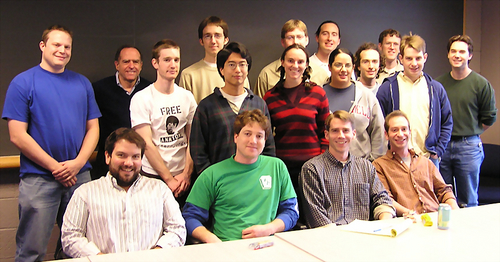Handling editor: Phanikrishna Thota
Cornell IGERT Program in Nonlinear Systems
John Guckenheimer
The Cornell
IGERT Program in Nonlinear Systems is one of 125 Integrative Graduate Education and Research
Traineeship Programs sponsored by the US National
Science Foundation. The NSF states:
"The Integrative
Graduate Education and Research Traineeship (IGERT) program has been
developed to meet the challenges of educating U.S. Ph.D. scientists
and engineers who will pursue careers in research and education, with
the interdisciplinary backgrounds, deep knowledge in chosen
disciplines, and technical, professional, and personal skills to
become, in their own careers, leaders and creative agents for change.
The program is intended to catalyze a cultural change in graduate
education, for students, faculty, and institutions, by establishing
innovative new models for graduate education and training in a fertile
environment for collaborative research that transcends traditional
disciplinary boundaries. It is also intended to facilitate diversity in
student participation and preparation, and to contribute to the
development of a diverse, globally-engaged, science and engineering
workforce."
The NSF IGERT awards provide five years of support, primarily for
graduate student fellowships. The Cornell IGERT Program in Nonlinear
Systems began in 1997, one of the first cohort of IGERTs, and received
a renewal award in 2002. During the period 2003-08, the renewal award
will fund 30 two-year fellowships. The fellowships are restricted to
US citizens and permanent residents. Nationally, NSF makes
approximately 20 new IGERT awards each year from over 500
proposals. The range of subjects encompassed is extremely broad,
ranging from nanophotonics to inequality and social policy.
The nineteen current
IGERT fellows in our program are also a diverse
group, coming from fourteen different fields. (Graduate education at
Cornell is organized into Fields of Study rather than by department,
allowing for interdisciplinary Fields like
Applied
Mathematics that draw faculty from many different departments.)
IGERT fellows commit to fulfilling several requirements: courses on
nonlinear dynamics and
computational methods for nonlinear systems,
completion of a year-long project in nonlinear systems, a summer
internship, participation in an IGERT seminar and attendance at
IGERT-sponsored colloquia in diverse fields. Consistent with the NSF
goals for IGERT, these activities broaden the graduate education of the
fellows. This IGERT is a "disciplinary plus" program in that the IGERT
requirements are an addition to the requirements for a PhD in a
student's major Field.
 |
|
| The IGERT Seminar, Fall 2005 |
| Seated: Derek Cabrera (Education), James Mandel (Ecology
and Evolutionary Biology), David Ashley (Mechanical Engineering), Sam
Arbesman (Computational Biology); Standing: Brett Streetman (Aerospace
Engineering), John Guckenheimer (Director), Bret Hanlon (Statistics),
Bryan Daniels (Physics), Richard Yamada (Applied Mathematics), Lauren
Childs (Applied Mathematics), Gordon Berman (Physics), Mark Albert
(Computational Biology), Heather Flores (Genetics and Development),
Jordan Albert (Chemical Engineering), Daniel Brown (Mechanical
Engineering) John Dietl (Mechanical Engineering) and Chris Cameron
(Sociology). Not in the picture: Lydia Contreras (Chemical
Engineering), Amina Kinkhabwala (Neurobiology and Behavior), Sam
Walcott (Theoretical and Applied Mechanics). |
There are four focus areas for the program, each with a lead
faculty member.
- Complex Networks
(Steve
Strogatz)
- The 1998 paper Collective dynamics of 'small-world' networks by
Duncan Watts and Steve Strogatz stimulated interest in the analysis of
the statistical properties of complex networks of social interactions,
power systems, world wide web links, and molecular interactions within
a cell. Research activities on complex networks at Cornell include
the 2005-08 theme project
Getting Connected of the Institute for Social
Sciences and an interdisciplinary Internet Archive Cybertools project led by
sociologist
Michael Macy with computer scientist participants
Bill Arms,
Dan
Huttenlocher and
Jon
Kleinberg.
- Gene Regulation
(Jim Sethna)
- The Cornell New Life Sciences Initiative includes an
emphasis upon the interactions between the life sciences and physical
sciences. Sethna,
Rick Cerione,
Kelvin Lee and
Chris
Myers have been leading a group of students exploring quantitative
models for cell-signaling networks and related problems. The emphasis
has been on parameter estimation for differential equations models of
cellular networks from data. The group uses Monte-Carlo-Gibbs sampling
methods and has developed the
sloppy
cell software for fitting models to data when the output of
the model has large ranges of sensitivity to parameters.
- Machines and Organisms - Locomotion and Manipulation
(Francisco
Valero-Cuevas)
- The dexterity, efficiency and agility of movement and locomotion
in animals surpasses the capabilities of machines that we build.
Biology provides inspiration for machines we design and build while
computational models and machines allow us to test our understanding of
biology. Highlights of research in this area include insect flight
(Jane
Wang) and running
(John
Guckenheimer), efficient walking robots
(Andy Ruina)
and flying machines with flapping wings
(Ephraim Garcia), manipulation
(Francisco
Valero-Cuevas), muscle biology
(John Hermanson) and the use of evolutionary
algorithms to design robots
(Hod
Lipson).
- Pattern Formation
(Robert Gilmour)
- Waves of electrical action potentials drive the heartbeat. Heart
rhythm disorders are frequently lethal. This focus group studies ionic
mechanisms in heart cells and patterns of wave propagation in the
heart. There is an emphasis on quantitative comparisons between models
and data.
Students either choose projects in one of these focus areas or they
recruit at least two faculty members in different research areas to
jointly mentor their projects. One objective of the student projects
is to bring together empirical data, theory and computation. The focus
areas represent only a subset of research on nonlinear systems and
dynamics at Cornell. Links from other
faculty associated with the IGERT Program can be
used to sample more. Additionally, complex dynamics is a strong area
of research within the Field of Mathematics, led by senior faculty
John Hubbard,
Yulij Ilyashenko and
John Smillie.
Applicants to PhD programs at Cornell are nominated for IGERT
fellowships by their prospective Fields. They may indicate their
interest in the program in their applications; field admissions
committees also identify students whom they think will be interested in
the program. The field system of graduate education allows students
unusual flexibility in their academic programs and encourages
interdisciplinary research. Joint mentorship of graduate students is
welcomed as a mechanism for interdisciplinary collaborations among
faculty.